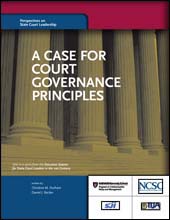 |
During the 1970s and 1980s, the structure of state courts changed from being essentially locally organized to being more centralized at the state level. The change, however, was incomplete. In A Case for Court Governance Principles, Utah Chief Justice Christine Durham and Utah State Court Administrator Dan Becker describe the limits to what structural changes like centralization can accomplish. Recognizing that court culture inherently stresses independence and self-interest, the authors propose eleven unifying principles to guide states as they seek to improve court performance. Justice Christine Durham has been on the Utah Supreme Court since 1982 and has served as Chief Justice since 2002. She served as President of the Conference of Chief Justices 2009-10. In 2007, she received the William H. Rehnquist Award for Judicial Excellence. Utah State Court Administrator Becker took office on September 25, 1995. He previously served in court administration in the states of North Carolina and Georgia. He served as President of the Conference of State Court Administrators in 2004-05. In 2006, he received the Warren E. Burger Award for Excellence in Court Administration. | |
More videos on the Harvard Executive Session are available here.
The Executive Session develops and answers questions that U.S. state courts will face in the foreseeable future, attempting to clarify what leaders of state courts can and should do to distinguish their role in our system of democratic governance.